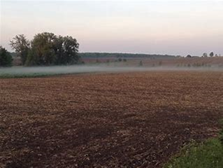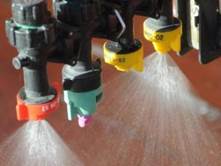Hello,
Nearly a month has passed since the Conservation Tillage Conference was held in Ada. The two day conference attracted 875 people, including speakers, moderators and exhibitors. If you didn’t get a chance to hear a speaker that you were interested in or if you didn’t attend this year but are thinking about going next year, almost all of the speaker presentations are now online for viewing, See the attached mid-April Ohio No-Till News for more information or go to ctc.osu.edu to view videos from the 70+ speakers who presented at this year’s conference. The first ever annual Hardin County Goat Banquet will be held on Saturday, April 7 at the Family Center of the Christian Missionary Alliance Church located at 15436 State Route 309 in Kenton. Registration and seating will open at 5:00 pm. Supper and the speaker will begin at 5:30. There is no cost, as each family is asked to bring a side dish and/or dessert. The main dishes, drinks, and table service will be provided. There is no need to pre-register. See the attached news release and flyer for more information about this year’s goat banquet.
A Good Agricultural Practices (GAPs) class has been planned in Hardin County. GAPs classes are training sessions for fruit and vegetable producers taught by personnel from Ohio State University’s Fruit and Vegetable Safety Program. The April 11th program will be from 12:30 – 3:30 pm at the Scioto Valley Produce Auction, 18715 County Road 200, Mt. Victory. The GAPs class is open to all fruit and vegetable producers and will be presented without technology. If you are interested in attending this program, see the attached article and flyer for registration details. The OSU Extension Beef Team has announced the details for the 2018 Ohio Beef Cattle School. The Hardin County Extension office will serve as a host site for this spring’s video series. The 2018 Ohio Beef School will begin on April 25 and will conclude on April 30. The theme of this year’s beef school will focus on ‘Gaining Greater Market Access for Ohio Feeder Calves.’ Following the beef cattle school, Beef Quality Assurance training will be offered at a later date. Sessions will be hosted at the Hardin County OSU Extension office, 1021 W. Lima Street, Kenton so check out the news release and flyer for more information about this year’s speakers.
- GAPs Class News Release
- 2018 Hardin County GAPs Flyer
- Ohio Beef School Flyer
- Ohio Beef School News Release
The Ohio Pork Council is partnering with Brookside Laboratories to offer discounted manure ($20) and soil samples ($3) for swine producers in an effort to promote best management practices and water quality. In order to qualify for the discounted rate, swine producers must take a short survey and then pick-up the sample bottles or bags at the Extension office. You will need a special code to get the discounted rate, so see the attached news release to take advantage of this special opportunity and get your swine manure and soil sampled to improve nutrient management on your farm. There is a special Inversion & Drift Mitigation Workshop being held on April 10 from 10:00-noon. How to recognize an inversion and other weather conditions that affect applications, as well as New tools are available in the sensitive crop registry to meet label requirements, plan herbicide applications, and integrate with spray application equipment will be topics of this program that can be attended either in person in Columbus or online. See the attached flyer for information about how you can participate or give me a call at 419-674-2297 if you would like to view it at the Extension office. Finally, the Ohio Sensitive Crop Registry is changing to include two components: DriftWatch, and BeeCheck. See the attached flyer to find out more.
As always, be sure to check out the agronomy articles below for timely information from the C.O.R.N. Newsletter. Upcoming local events this week include Ag Council tomorrow morning (4/6) starting at 7:00 am at Henry’s Restaurant. Join us for a discussion on Ag Policy with Farm Bureau covering the cost of breakfast. Men’s Garden Club will meet at the home of Bob Terry near Kenton Monday (4/9) starting at 6:30 pm. The Soil and Water Conservation District fish sale order pick-up is Tuesday (4/10) starting at 2:30 pm at the SWCD office. The Sheep Improvement Association will meet on Tuesday (4/10) starting at 7:30 pm at the Extension office. The Soil and Water Conservation tree sale order pick-up is Thursday (4/12) at the SWCD office.
Mark
Big Claims, Big Questions, Big Potential in Small Packages: Learn More About Microbe-containing Crop Biostimulants – Matt Kleinhenz
A large and increasing number of agronomic, forage, and specialty (horticultural) crop producers use or are interested in microbe-containing crop biostimulants advertised to enhance crop growth, perhaps especially under sub-optimal conditions. These inoculants are applied as a seed treatment, soil amendment (e.g., during transplanting and irrigation), or, less often, foliar spray. Inoculating crops with potentially beneficial microbes is a very long-standing practice but much has changed in recent years. The spike in the number and diversity of microbe-containing products, number of acres to which they are applied, and range of cropping systems and settings within those acres are just three noticeable changes. Unfortunately, those changes have not been matched by the availability of resources providing reliable guidance on getting the most from these products. To read more, go to https://agcrops.osu.edu/newsletter/corn-newsletter/2018-06/big-claims-big-questions-big-potential-small-packages-learn-more.

New Ohio Recommended Corn Nitrogen Fertilizer Rates Now Available – Steve Culman, Anthony Fulford, Peter Thomison, Rich Minyo, Eric Richer, Harold Watters, Greg LaBarge, Joe Nester, Karen Chapman
Ohio State University corn nitrogen rate recommendations follow a unified framework used throughout the Corn Belt. Together with six other states (Iowa, Illinois, Indiana, Michigan, Minnesota, Wisconsin), the Ohio recommended nitrogen rates are not based on yield goals, but on economic returns. Corn yield responses along with corn and nitrogen prices are used to calculate the point at which the last unit of added nitrogen returns a yield increase large enough to pay for the added nitrogen cost. This approach, called the maximum return to nitrogen (MRTN), is favored because of the economic volatility in both corn grain and nitrogen fertilizer prices. The past 10 years provides ample evidence of these fluctuations. Go tohttps://agcrops.osu.edu/newsletter/corn-newsletter/2018-07/new-ohio-recommended-corn-nitrogen-fertilizer-rates-now-available to read more about the MRTN method of calculating corn nitrogen rates.
Pay Attention to Nozzle Selection to Meet Label Requirements for the New 2,4-D and Dicamba Products – Erdal Ozkan
Generally, this is the time of the year you complete shopping for nozzles because the spraying season is just around the corner. This task must be on top of your to do list if you are one of those who will be applying the new 2,4-D or Dicamba products for crops that are resistant to these products. If you plan to use Dicamba products for weed control, you better check the labels because you now have to use one of the nozzles they recommend on their labels, and operate those nozzle within a recommended range of pressures. Go to https://agcrops.osu.edu/newsletter/corn-newsletter/2018-07/pay-attention-nozzle-selection-meet-label-requirements-new-24-d to finish reading this article.

Spring Management of Ohio Winter Malting Barley – Laura Lindsey
Management of Ohio Winter Malting Barley (including spring management) is now available online at: https://stepupsoy.osu.edu/winter-malting-barley Keep in mind, this is a working document that will be updated as we learn more about winter malting barley management. Ohio farmers need to carefully consider growing winter malting barley as it may not be suitable for all operations. Malt quality barley must meet several criteria to avoid being rejected by the malt facility- this risk may be too high for certain farmers since today there are no markets in Ohio for barley that does not meet the requirements for malt. Malting barley is not sold through traditional grain elevators like corn, soybean, and wheat, so contracts or agreements should be in place before planting. Special considerations for post-harvest handling include drying capability, grain cleaning, and delivering in totes (versus hopper trucks). Each farmer must understand the unique challenges of growing malt quality barley before contracting and purchasing seed.
 Inversion and Drift Mitigation Workshop to be held April 10 – Cindy Folck
Inversion and Drift Mitigation Workshop to be held April 10 – Cindy Folck
Do you know the weather conditions that contribute to inversions? A workshop on April 10 will focus on tools to help farmers recognize inversions and other weather conditions that affect drift. Aaron Wilson, weather specialist and atmospheric scientist, will discuss weather trends and how to recognize inversions. Additionally, workshop attendees will learn about the new tools available through the Ohio Sensitive Crop Registry by Field Watch to increase communication between field crop and specialty crop growers. The workshop will be April 10, from 10 a.m. to noon. Farmers can attend the workshop in person for no charge at the Ohio 4-H Center on the Ohio State University Columbus campus. Farmers can also attend virtually for no cost. Links for registration for in-person or virtual attendance are available at http://go.osu.edu/IPM. Pesticide applicator recertification credit will only be available at the in-person workshop at the Ohio 4-H Center in Columbus. For more information, contact Cindy Folck at folck.2@osu.edu or 614-247-7898. The workshop is supported by the Ohio IPM Program and USDA NIFA 20177000627174.
Mark A. Badertscher
Agriculture and Natural Resources Educator
OSU Extension Hardin County
1021 W. Lima Street, Suite 103, Kenton, OH 43326
419-674-2297 Office
hardin.osu.edu


